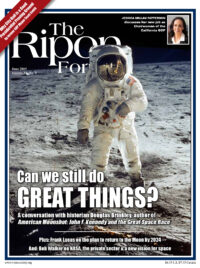
Fifty years ago, the whole world watched America put human footprints on the Moon. That moment was more than a technological triumph and point of national pride. Humans walking on the Moon was a monumental historic achievement never to be forgotten. And even today we remain the only nation ever to have humans travel beyond low earth orbit (LEO).
In the years since, we have made our economy and our national security utterly dependent on space. No aspect of our $19 trillion economy is without some connection to space-based assets. The asymmetric advantages that our military has in its missions are directly tied to our ability to utilize space. But today our economy and our national security are threatened by other international players who want to deny us those advantages. And so, we now face the reality that our adversaries are introducing offensive and defensive weapons in space which we must counter. Space has become a place of confrontation and potential conflict.
Whoever came to power in 2017 was going to be faced with space challenges. New technologies for launch to space and for use in space needed to be developed. We had to train and equip military personnel to defend our space interests. We could not send American astronauts to our Space Station on American built rockets. We lacked coordination among the various agencies of the federal government on key issues of space policy. Our planning for deep space human exploration was hampered by disagreement over whether we should go back to the Moon or go directly to Mars. And the traditional space contractors were battling the new space entrepreneurs over how government money should be allocated.
NASA must restructure itself as a developer of new space technologies, but it must do so in conjunction with the entrepreneurial space businesses.
The election of Donald Trump reset the space table. He had promised during his campaign to reinstitute the National Space Council led by the Vice President to organize and coordinate the various space entities within the government and to reach beyond government to find private companies and private capital willing to join in the nation’s space programs. He did that very quickly and supplied specific missions for the Council with a series of Presidential Space Directives. Today, the NSpC holds regular meetings where the multiple agencies with space portfolios report on what they are doing to carry out the presidential directives. This need for regular public reporting has driven significant activity.
The challenge posed by international adversaries in space has been a focus of the Trump Administration. In particular, the President has called for the establishment of a Space Force as an independent branch of the military just like the Army, Navy, Air Force, and Marines. The new branch would organize, train, and equip military personnel to respond to threats we face in space and from space. The problem now is that each of the other military branches has their specific mission on land or sea or in the air. While they see space as an essential component of their role, none have it as their primary focus. The situation has become so critical that a branch with space as its total focus is necessary.
Another Trump initiative promised in the campaign was a renewed emphasis on human space exploration beyond LEO. The specific promise was to have an aggressive program aimed at driving technology development by focusing on human exploration of the entire solar system within a century. What that portends is moving beyond chemical rockets to nuclear power and eventually even anti-matter engines.
But it starts with going back to the Moon and establishing a permanent human presence there. The Vice President shocked the space community by setting a goal for this accomplishment by 2024. NASA has gone to work to move its legacy programs forward to meet that goal and requested the funding that would be required. At the same time there are commercial companies with their own similar plans, and the Vice President said that the goal would be reached by any means available. Just recently Jeff Bezos on behalf of his Blue Origin space company showed a prototype of Moon lander that he said could be placed on the Moon by 2023 with humans following by 2024. And he is presently building a rocket big enough to take all 33,000 pounds of that lander to the Moon’s surface.
Looking ahead, there needs to be a public understanding and a government understanding that a new era of space with new space realities has arrived. The fundamental realization must be that space is essential to life as we know it.
NASA can no longer be the only doorway you walk through on your way to orbit.
Space is now a competitive zone with satellites chasing satellites all the time. Our military must be given the organization and the resources to protect our space assets. Our other space-related government agencies must revisit their roles.
The Department of Commerce is already preparing to do space situational awareness and traffic management with thousands of new satellites expected to be placed in orbit. They will also have to be involved with cleaning up space debris because we now have billions of pieces of space junk, large and small, which are threatening to clog space access and damage on-orbit satellites
NASA must restructure itself as a developer of new space technologies, but it must do so in conjunction with the entrepreneurial space businesses. It can no longer be the only doorway you walk through on your way to orbit. More than a decade ago, a presidential commission recommended that more of NASA’s centers reconstitute themselves as Federally Financed Research and Development Centers like the Jet Propulsion Laboratory has always been. The reasoning was NASA would have a greater ability to interact with commercial companies as a source of expertise and could draw upon outside companies to help NASA with the government funded projects. That recommendation is still valid.
The Trump Administration has brought excitement and inspiration back to the space enterprise. The past record shows us when we lead in space, we lead on earth. That is the reality that President Trump has given us in a new vision for space.
Robert S. Walker represented the 16th District of Pennsylvania in the U.S. House of Representatives from 1977 to 1997. He served as chairman of the House Science, Space, and Technology Committee, and is the former chairman of the Commission on the Future of the U.S. Aerospace Industry. He is currently the Founder and Chief Executive Officer of moonWalker Associates.




